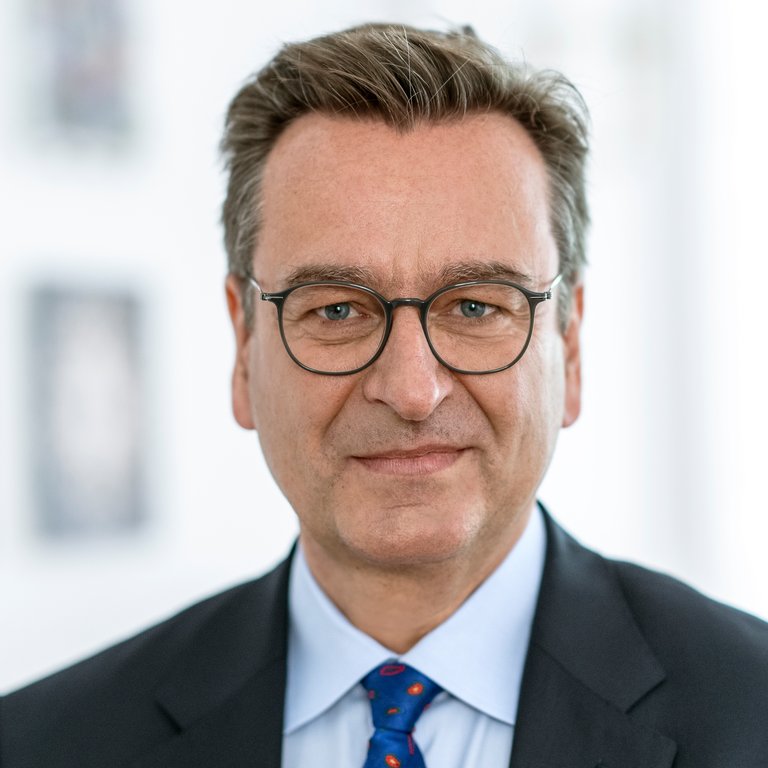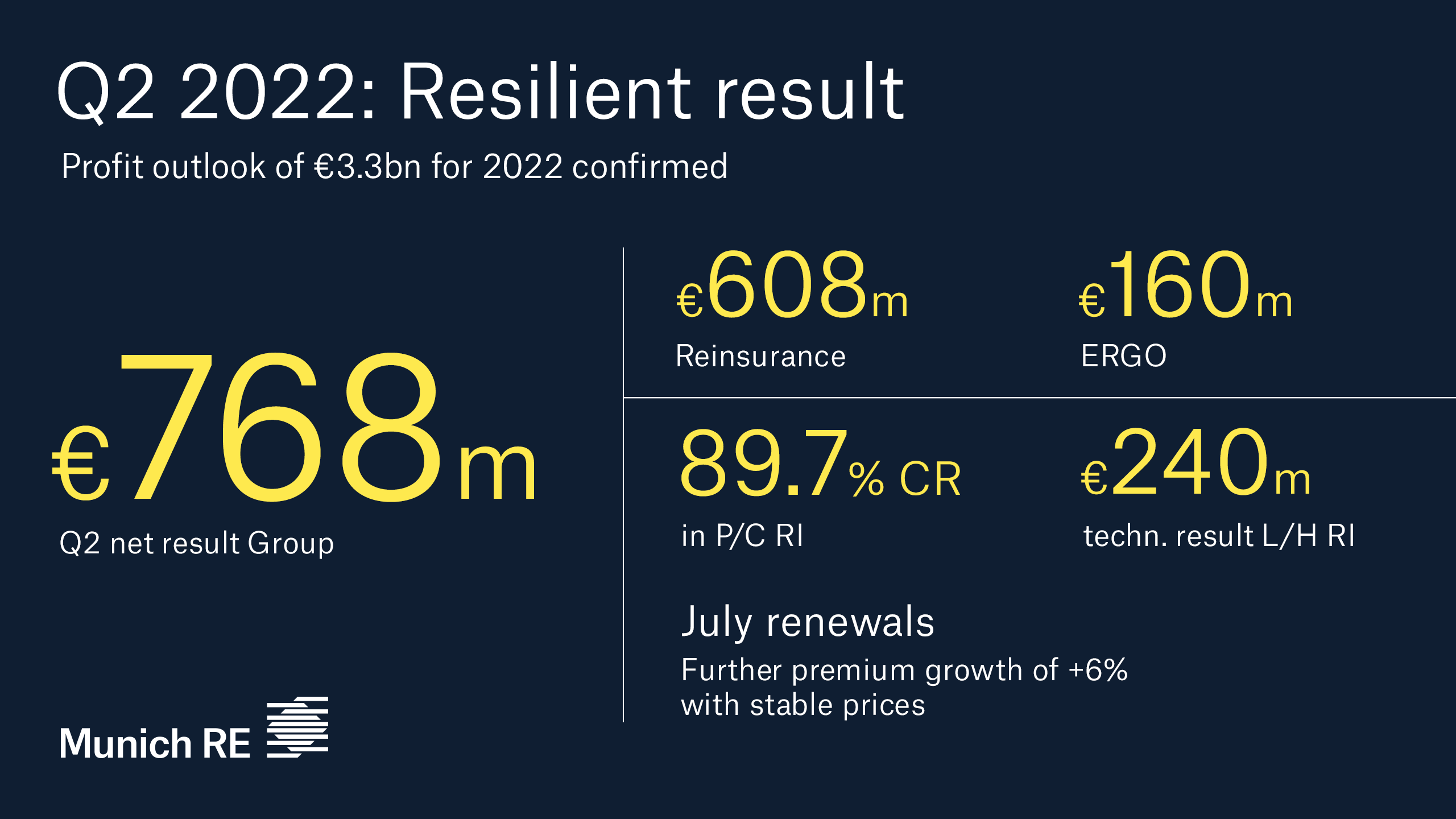Munich Re posts solid quarterly result
08/09/2022
Group
properties.trackTitle
properties.trackSubtitle
- Munich Re generates profit of €768m in Q2; confirms annual target
- Low combined ratio in property-casualty reinsurance; very good technical result in life and health reinsurance
- ERGO contributes €160m (155m) to Group Q2 result
- Strong increase in reinvestment yield; falling share prices and higher interest rates adversely impact investment result
- July renewals show premium growth (+6%) with stable prices (+0.1%)

Munich Re has posted a solid quarterly result despite fierce headwinds from inflation, the cooling economy and the war in Ukraine. The profitability of our business is very good, and we again saw clear and profitable growth. Our clients are all the more appreciative of our strong balance sheet in these uncertain times. Now is the time to seize opportunities in markets that are continuing to harden. At the same time, we are systematically increasing the share of earnings generated by less-cyclical business. The rise in interest rates will give us tailwind in the long term by allowing us to benefit from higher running yields. Our annual target and our objectives for our “Ambition 2025” medium-term strategy are firmly in sight.

Summary of Q2 figures
Munich Re generated a profit of €768m (1,106m) in the second quarter of 2022, and €1,376m (1,695m) in the first six months of the year. The operating result was €763m, compared with €1,554m for the same quarter last year, and the other non-operating result amounted to –€11m (–9m). Furthermore, the currency result was €485m (–117m), mainly owing to currency gains on the US dollar. The tax ratio rose sharply to 35.5% (19.6%). Gross premiums written saw a considerable rise year on year, by 8.3% to €15,850m (14,642m) in Q2, and by 12.0% to €32,683m (29,193m) in Q1–2 – in both cases driven by strong organic growth, especially in property-casualty reinsurance.
At €23,486m, equity was down from the level at the start of the year (€30,945m), mainly due to a decline in valuation reserves on fixed-interest securities. The latter was attributable to a rise in interest rates that is economically advantageous for insurers. The solvency ratio was approx. 252% (227% as at 31 December 2021), which is above the optimum range (175–220%).
In Q2 2022, annualised return on equity (RoE) amounted to 12.3% (19.2%); the RoE for the first half-year was 11.2% (15.0%).
Reinsurance: Result of €608m
The reinsurance field of business contributed €608m (951m) to the consolidated result in Q2 and €1,120m (1,361m) in the first half-year. The year-on-year decline was mainly due to the negative investment result in this field of business. The operating result totalled €636m (1,274m) in Q2, and gross premiums written increased to €11,339m (10,299m).
Life and health reinsurance business generated a profit of €147m (93m) in Q2. Premium income rose to €3,287m (3,144m). Business with non-significant risk transfer (fee income) continued to see very pleasing growth. The technical result, including business with non-significant risk transfer, rose to €240m (64m). COVID-19-related losses amounted to €100m in Q2 and €259m in Q1–2.
In Q2, property-casualty reinsurance business contributed €462m (858m) to the result. Premium volume grew considerably to €8,052m (7,155m). The combined ratio amounted to 89.7% (90.1%) of net earned premiums for Q2, and 90.5% (94.3%) for Q1–2. The normalised combined ratio was 94.9%.
Major losses of over €10m each totalled €575m (432m) in Q2. These figures include gains and losses from the settlement of major losses from previous years. Major-loss expenditure corresponded to 7.5% (6.8%) of net earned premiums, and was thus below the long-term average expected value of 13%, both for Q2 and for the half-year (8.3%). Man-made major losses grew to €322m (229m), including €90m of losses caused by Russia’s attack on Ukraine (Q1–2: approximately €200m). Major-loss expenditure from natural catastrophes increased slightly to €253m (203m). The costliest natural catastrophe for Munich Re in Q2 was the drought in South America, with losses amounting to some €130m.
In Q2, loss reserves of €308m (252m) were released for basic losses from prior years, which corresponds to 4.0% (4.0%) of net earned premiums. Munich Re continually seeks to set the amount of provisions for newly emerging claims at the very top end of the estimation range so that profits from the release of a portion of these reserves can be generated at a later stage.
In the reinsurance renewals as at 1 July 2022, Munich Re exploited growth opportunities successfully and increased the volume of business written to €4.4bn (+6%). The primary focus of the renewals was business in North America, South America, Australia, and with global clients.
Prices were up overall in the sectional markets, with significantly different trends dependent upon claims experience, future loss expectations and the situation in each individual market. Prices for reinsurance cover rose considerably in some markets, including the US, Latin America and Australia. These increases were sufficient overall to offset elevated loss expectations owing to inflation or other developing trends.
All in all, prices for the Munich Re portfolio continued to be at a high level (+0.1%). This figure is, as always, risk-adjusted. In other words, price increases are offset if they are associated with increased risk and, consequently, elevated loss expectations. Particularly in light of higher inflation, Munich Re was deliberately cautious in calculating future loss expectations. Similarly, changes are offset by the composition of different classes of business in the portfolio so as to make valid comparisons possible.
For the next round of renewals in January, Munich Re expects that the market environment will remain favourable and should offer attractive business opportunities.
ERGO: Result of €160m
Munich Re generated a profit of €160m (155m) in its ERGO field of business in Q2 and €256m (334m) in Q1–2, despite ongoing volatility in the capital markets. ERGO also saw significant growth in the second quarter: total premium income climbed to €4,782m (4,616m) in Q2; gross premiums written rose to €4,511m (4,343m).
ERGO Life and Health Germany posted particularly strong premium growth. The result in this segment increased to €59m (33m), mainly as a result of a high investment result, especially in life business. In the International segment, the result rose to €56m (41m) as a consequence of a strong operational performance, particularly in Austria and the Baltic states, and an exceptionally good result in Belgian health business. Following the very good profit generated in the same period of the previous year, ERGO Property-casualty Germany made a profit contribution of €45m (81m). An improved operational performance was not able to fully offset the low investment result. The operating result for the ERGO field of business amounted to €127m (281m).
In Property-casualty Germany, the combined ratio was 86.9% (92.6%) in Q2, thus at a very good level, and 91.9% (93.4%) in Q1–2. This significant improvement is attributable to positive claims experience and ongoing premium growth in the second quarter. In the International segment, the combined ratio rose to 94.5% (92.2%) in Q2 owing to higher losses in Poland and in Spanish health business; in Q1–2, the ratio was 93.5% (93.0%).
Investments: Investment result of €971m
Munich Re’s investment result decreased to €971m (1,933m) in Q2. Regular income from investments climbed to €1,800m (1,645m). Net gains and losses on disposal excluding derivatives amounted to €727m (627m). The net balance of derivatives amounted to –€446m (–90m), chiefly owing to losses on derivatives on fixed-interest securities. The net balance of write-ups and write-downs declined substantially to –€908m (–77m), which was primarily due to impairment losses on equities, triggered by falling equity markets.
Overall, the Q2 investment result represented a return of 1.6% on the average market value of the portfolio. The running yield was 3.0% and the yield on reinvestment rose substantially to 2.8%. The equity-backing ratio including equity derivatives amounted to 7.0% as at 30 June 2022 (7.7% as at 31 December 2021).
The investment portfolio as at 30 June 2022 declined compared with the 2021 year-end figure, with the carrying amount decreasing to €223,275m (240,300m); the market values amounted to €230,951m (257,485m). The main reason for the decline was the increase in interest rates.
Outlook for 2022: Annual target unchanged at €3.3bn
As a result of high impairment losses on equities and fixed-interest securities in the first six months of 2022, Munich Re now expects the investment result to represent a return of over 2.0% (previous forecast: over 2.5%).
The other targets communicated for 2022 in Munich Re’s Group Annual Report 2021 remain unchanged. Munich Re is still aiming for a consolidated result of €3.3bn for the 2022 financial year. The achievement of this result target is supported by a remaining major-loss budget in property-casualty reinsurance of around €2.7bn for the rest of the year.
All forecasts and targets face considerable uncertainty owing to fragile macroeconomic developments, volatile capital markets and the unclear future of the pandemic. In particular, there continues to be considerable uncertainty regarding the financial impact of the Russian war of aggression in Ukraine. As always, the projections are subject to major losses being within normal bounds, and to the income statement not being impacted by severe fluctuations in the currency or capital markets, significant changes in the tax environment, or other one-off effects.
Munich Re is one of the world’s leading providers of reinsurance, primary insurance and insurance-related risk solutions. The group consists of the reinsurance and ERGO business segments, as well as the asset management company MEAG. Munich Re is globally active and operates in all lines of the insurance business. Since it was founded in 1880, Munich Re has been known for its unrivalled risk-related expertise and its sound financial position. It offers customers financial protection when faced with exceptional levels of damage – from the 1906 San Francisco earthquake through to the 2021 Hurricane Ida. Munich Re possesses outstanding innovative strength, which enables it to also provide coverage for extraordinary risks such as rocket launches, renewable energies or cyber risks. The company is playing a key role in driving forward the digital transformation of the insurance industry, and in doing so has further expanded its ability to assess risks and the range of services that it offers. Its tailor-made solutions and close proximity to its customers make Munich Re one of the world’s most sought-after risk partners for businesses, institutions, and private individuals.
Disclaimer
This media release contains forward-looking statements that are based on current assumptions and forecasts of the management of Munich Re. Known and unknown risks, uncertainties and other factors could lead to material differences between the forward-looking statements given here and the actual development, in particular the results, financial situation and performance of our Company. The Company assumes no liability to update these forward-looking statements or to make them conform to future events or developments.
Further information
For media inquiries please contact
/Straub_Stefan.jpg)
/Ziegler_Frank.jpg)
/Faith_Thoms.jpg)
/Ashleigh-Lockhart.jpg/_jcr_content/renditions/crop-1x1-400.jpg./crop-1x1-400.jpg)